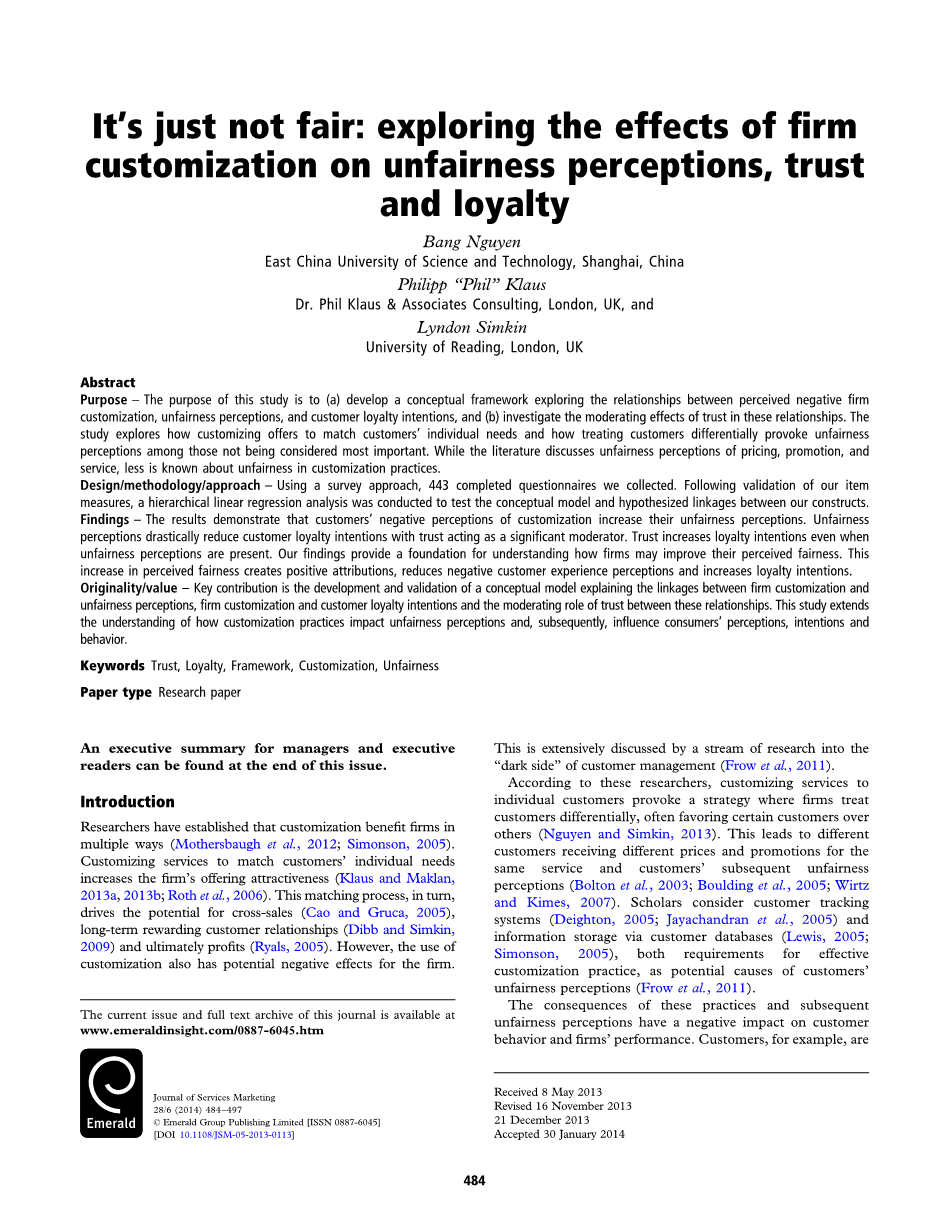

英语原文共 16 页,剩余内容已隐藏,支付完成后下载完整资料
Itrsquo;s just not fair: exploring the effects of firm customization on unfairness perceptions, trust and loyalty
这是不公平的:探索企业定制对不公平感知,信任和忠诚的影响
East China University of Science and Technology, Shanghai, China
Philipp “Phil” Klaus
Dr. Phil Klaus amp; Associates Consulting, London, UK, and
Lyndon Simkin
University of Reading, London, UK
Abstract
摘要
Purpose – The purpose of this study is to (a) develop a conceptual framework exploring the relationships between perceived negative firm customization, unfairness perceptions, and customer loyalty intentions, and (b) investigate the moderating effects of trust in these relationships. The study explores how customizing offers to match customersrsquo; individual needs and how treating customers differentially provoke unfairness perceptions among those not being considered most important. While the literature discusses unfairness perceptions of pricing, promotion, and service, less is known about unfairness in customization practices.
目的-本研究的目的是(a)构建一个概念框架,探索感知的负面公司定制,不公平感知和客户忠诚意图之间的关系,以及(b)调查信任在这些关系中的调节作用。 该研究探讨了如何定制报价以满足客户的个人需求,以及如何区别对待客户,从而在不被认为最重要的人中产生不公平感。 虽然文献讨论了定价,促销和服务的不公平感,但对定制实践中的不公平性知之甚少。
Design/methodology/approach – Using a survey approach, 443 completed questionnaires we collected. Following validation of our item measures, a hierarchical linear regression analysis was conducted to test the conceptual model and hypothesized linkages between our constructs. Findings – The results demonstrate that customersrsquo; negative perceptions of customization increase their unfairness perceptions. Unfairness perceptions drastically reduce customer loyalty intentions with trust acting as a significant moderator. Trust increases loyalty intentions even when unfairness perceptions are present. Our findings provide a foundation for understanding how firms may improve their perceived fairness. This increase in perceived fairness creates positive attributions, reduces negative customer experience perceptions and increases loyalty intentions.
方法-我们收集了443份完成的问卷。 在验证我们的项目测量之后,进行了层次线性回归分析以测试概念模型和我们的构造之间的假设联系。 调查结果 - 结果表明,客户对定制的负面看法增加了他们的不公平感。 不公平的看法大大降低了客户忠诚度的意图,信任充当了重要的调节量。 即使存在不公平的看法,信任也会增加忠诚意图。 我们的研究结果为理解企业如何改善其公平性提供了基础。 感知公平性的这种增加创造了积极的归因,减少了负面的客户体验感知并增加了忠诚度意图。
Originality/value – Key contribution is the development and validation of a conceptual model explaining the linkages between firm customization and unfairness perceptions, firm customization and customer loyalty intentions and the moderating role of trust between these relationships. This study extends the understanding of how customization practices impact unfairness perceptions and, subsequently, influence consumersrsquo; perceptions, intentions and behavior.
独创性/价值-主要贡献在于概念模型的开发和验证,解释了企业定制与不公平感知,企业定制和客户忠诚意图之间的联系以及这些关系之间信任的调节作用。 本研究扩展了对定制实践如何影响不公平感知的理解,并随后影响消费者的感知,意图和行为。
Keywords Trust, Loyalty, Framework, Customization, Unfairness
关键词 信任,顾客忠诚度,概念框架,定制,不公平感
Paper type Research paper
Introduction
绪论
Researchers have established that customization benefit firms in multiple ways (Mothersbaugh et al., 2012; Simonson, 2005). Customizing services to match customersrsquo; individual needs increases the firmrsquo;s offering attractiveness (Klaus and Maklan, 2013a, 2013b; Roth et al., 2006). This matching process, in turn, drives the potential for cross-sales (Cao and Gruca, 2005), long-term rewarding customer relationships (Dibb and Simkin, 2009) and ultimately profits (Ryals, 2005). However, the use of customization also has potential negative effects for the firm. This is extensively discussed by a stream of research into the “dark side” of customer management (Frow et al., 2011).
研究人员已经建立了多种方式的定制受益公司(Mothersbaugh等,2012; Simonson,2005)。 定制服务以满足客户的个性化需求,增加了公司的吸引力(Klaus和Maklan,2013a,2013b; Roth等,2006)。 反过来,这种匹配过程推动了交叉销售的潜力(Cao和Gruca,2005),长期有益的客户关系(Dibb和Simkin,2009)以及最终的利润(Ryals,2005)。 但是,定制的使用也会给公司带来潜在的负面影响。通过对客户管理“黑暗面”的研究进行了广泛的讨论(Frow等,2011)。
According to these researchers, customizing services to individual customers provoke a strategy where firms treat customers differentially, often favoring certain customers over others (Nguyen and Simkin, 2013). This leads to different customers receiving different prices and promotions for the same service and customersrsquo; subsequent unfairness perceptions (Bolton et al., 2003; Boulding et al., 2005; Wirtz and Kimes, 2007). Scholars consider customer tracking systems (Deighton, 2005; Jayachandran et al., 2005) and information storage via customer databases (Lewis, 2005; Simonson, 2005), both requirements for effective customization practice, as potential causes of customersrsquo; unfairness perceptions (Frow et al., 2011).
根据这些研究人
全文共51581字,剩余内容已隐藏,支付完成后下载完整资料
资料编号:[930]
以上是毕业论文外文翻译,课题毕业论文、任务书、文献综述、开题报告、程序设计、图纸设计等资料可联系客服协助查找。


